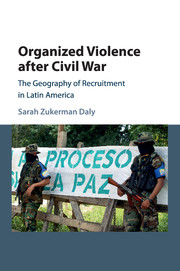Crossref Citations
This Book has been
cited by the following publications. This list is generated based on data provided by Crossref.
Nussio, Enzo
2016.
Ex-Combatants and Post-Conflict Violence: Are Yesterday's Villains Today's Principal Threat?.
SSRN Electronic Journal,
2016.
Rebelocracy.
p.
403.
Gutiérrez-Sanín, Francisco
and
Wood, Elisabeth Jean
2017.
What Should We Mean by “Pattern of Political Violence”? Repertoire, Targeting, Frequency, and Technique.
Perspectives on Politics,
Vol. 15,
Issue. 1,
p.
20.
Singh, Prerna
2017.
The Theoretical Potential of the Within-Nation Comparison: How Sub-National Analyses Can Enrich Our Understandings of the National Welfare State.
American Behavioral Scientist,
Vol. 61,
Issue. 8,
p.
861.
Matanock, Aila M.
and
Staniland, Paul
2017.
How and Why Armed Groups Participate in Elections.
SSRN Electronic Journal,
2017.
Conservative Parties and the Birth of Modern Democracy in Europe.
p.
428.
2017.
Forbearance as Redistribution.
p.
381.
Matanock, Aila M.
and
Staniland, Paul
2018.
How and Why Armed Groups Participate in Elections.
Perspectives on Politics,
Vol. 16,
Issue. 3,
p.
710.
Nussio, Enzo
2018.
Ex-combatants and violence in Colombia: are yesterday’s villains today’s principal threat?.
Third World Thematics: A TWQ Journal,
Vol. 3,
Issue. 1,
p.
135.
Flores, Thomas E
and
Vargas, Juan F
2018.
Colombia: Democracy, violence, and the peacebuilding challenge.
Conflict Management and Peace Science,
Vol. 35,
Issue. 6,
p.
581.
Daly, Sarah Zukerman
2018.
Determinants of ex-combatants’ attitudes toward transitional justice in Colombia.
Conflict Management and Peace Science,
Vol. 35,
Issue. 6,
p.
656.
Bultmann, Daniel
2018.
The social structure of armed groups. Reproduction and change during and after conflict.
Small Wars & Insurgencies,
Vol. 29,
Issue. 4,
p.
607.
Lehmann, Todd C.
2018.
The dynamics of radicalization: a relational and comparative perspective/Organized violence after civil war: the geography of recruitment in Latin America/Networks of rebellion: explaining insurgent cohesion and collapse.
Democratization,
Vol. 25,
Issue. 4,
p.
758.
Schulhofer-Wohl, Jonah
2018.
Syria, Productive Antinomy, and the Study of Civil War.
Perspectives on Politics,
Vol. 16,
Issue. 4,
p.
1085.
Meernik, James
DeMeritt, Jacqueline H.R.
and
Uribe-López, Mauricio
2019.
As War Ends.
p.
1.
Daly, Sarah Zukerman
2019.
Voting for Victors: Why Violent Actors Win Postwar Elections.
World Politics,
Vol. 71,
Issue. 04,
p.
747.
Bell, Mark S
2019.
Defending the “Acquisition-Use Presumption” in Assessing the Likelihood of Nuclear Terrorism.
International Studies Quarterly,
Vol. 63,
Issue. 3,
p.
774.
Meernik, James
2019.
Violence and Reconciliation in Colombia: The Personal and the Contextual.
Journal of Politics in Latin America,
Vol. 11,
Issue. 3,
p.
323.
2019.
Demanding Development.
p.
305.
Ishiyama, John
2019.
Identity Change and Rebel Party Political Success.
Government and Opposition,
Vol. 54,
Issue. 3,
p.
454.



